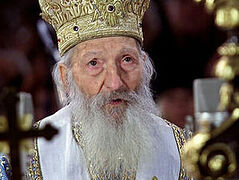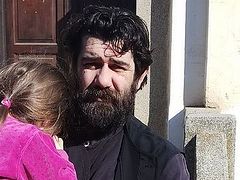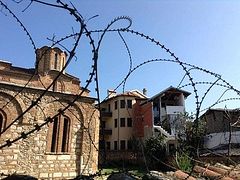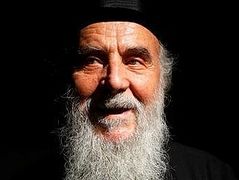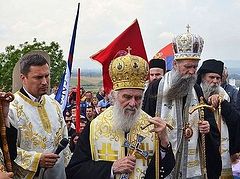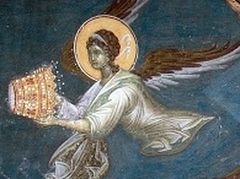It all began with a scandal. At the time when the progressives of mankind fought in a unified front against the dictator Milosevic and the “cursed Serbs,” one impudent French teenager dared to insist that France and Serbia share a long-standing relationship in the cultural sphere and as allies. And that all the Serbs had ever wanted was to protect their motherland and its people from disintegration. And that not every story told by the free press, one of the “freest” in the world, is true…
Simple as that, a teenager named Arnaud Yves Gouillon became the enfant terrible of his school in Grenoble. That is why he got a reprimand from the school’s principal and… a pat on the back from his father. Papa was thrilled: “You are learning to use your mind! Well, it means the lessons you received from your grandpa and me are paying off. It also means not all is lost! Glory to God! Hang in there, my boy. Your mama and I will always be with you through thick and thin. Your brothers are no idiots either, they’ll stick up for you as well.” Arnaud got support not only from his family but as history has shown, thousands of French people, as well.
The Gouillon are flesh and blood French with strong family traditions. Arnaud and his brothers remember the stories their grandfather and father shared about the history of their family and Europe as a whole. They knew too well that there were times when the Old World not only viewed Russians and Serbs with delight, but also when the French pinned their hopes on Serbia and Russia so that their belle France might recover and rise from slumber. The Arnaud family members knew about Anna Yaroslavna,[1] the Reims Gospel and why it was written in Cyrillic, or why the French kings used to take their coronation oaths on it. They also remembered about the more recent history when France, together with Russia and Serbia, had fought during the First and Second World Wars and the price the people of their countries had paid.
Should we betray our former allies? Or, should we believe that our friends had all of a sudden turned to sub-humans just because the TV and the papers claimed it or monsieur teacher lectured about it during his propaganda lessons? Not at all, at least not for Arnaud and his brothers, who were brought up differently in a tradition that still honors that good old Europe. Honor was prized highly in that old Europe. Some laid down their lives protecting it.
In 2004, the year memorable for the mass riots, when Arnaud saw from the news coverage by the most conscientious and fact-based mass media how the triumphant “oppressed” burned down churches and monasteries of the so-called “oppressors” and in fierce spitefulness tore off the crosses, or how the “oppressors” are forced to abandon their sacred land of Kosovo and Metohija by the thousands. This was when he, almost an adult by then, told his brothers and friends: “Okay guys, there’s nothing to be done. Our protests aren’t doing any good and we’ve got to do it differently. I suggest that we round up support for the Serbs locked inside their enclaves in Kosovo. Not with money, but with blankets, clothing, toys, and appliances, or what we can’t imagine our European life without. They are part of Europe and they can’t imagine their life without them as well. Let’s go and see Serbia. Let’s go see it firsthand.”
Said and done. They collected a truck full of must-have necessities and left for unknown Serbia seen off by the bewildered gazes of the majority of his compatriots and the excited looks of those who helped to collect the items. The travelers faced a depressing uncertainty ahead but they were invigorated by their ambition to learn everything themselves and to help the persecuted to the best of their ability.
That’s how Arnaud Gouillon drove into Kosovo and Metohija for the first time. He came and stayed there. Maybe not in a strictly physical sense, but spiritually and emotionally. As he saw what was really going on in the sacred Serbian land, he was amazed not only by the suffering of the Serbs, but by their trusting and bright reliance on help from Christ, and their self-sacrificing hospitality of “A guest is at the door—God is in the house,”—so that, in his own words, a fellow “without a drop of Serbian blood in his veins received a Serbian heart.” Upon his return, shaken to the core by what he saw and experienced, Arnaud was resolved to support Kosovo Serbs and be with them at all times. As a result, the organization, “Solidarity of Kosovo” «Solidarité Kosovo» was founded and it has been operating in France for the last ten years.
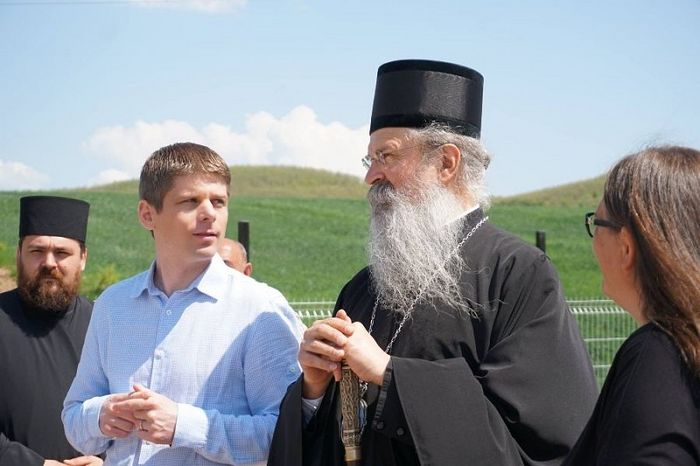 With Bishop Tedosije of Rasko-Prizren and Kosovo- Metohija.
With Bishop Tedosije of Rasko-Prizren and Kosovo- Metohija.
Gouillon can’t even remember how many times he drove trucks to Kosovo and Metohija. He’s gotten to know this country in earnest. And he became convinced that it is quite unsafe to be a Christian in the very heart of a formerly Christian Europe. He understood it through the eyes of the children he talked to, played, and joked with, that he has no right to come here only once, hand out chocolates, and then leave thinking his moral duty has been fulfilled. No way! To help means to offer help. Without any empty talk of “the need to show support”, but taking action instead.
“Actually, it remains to be seen who assists whom,” says Arnaud pausing to think. “You see, the Serbs residing in the enclaves taught us a lesson and they still teach us how to read the Bible by deeds rather than by simply reading it. They offer you plenty of opportunities to practice it. I remember how I was at Visoki Dečani for the first time. Imagine the monks living there in that hostile territory! They suffer from insults, threats, and theft almost daily and all they say is, “well, not a big deal, c’est la vie!” How did they not get embittered or take offense at the whole world! Yet, they keep their peaceful and generous spirit of prayer, and I simply cannot get it! Think of it, they even pray for those who persecute them!”
“I know,” I respond. “I have been there myself.”
“That’s right. You are one of our own, a Kosovo Serb. But you are the one who isn’t good enough.”
We laughed wistfully at the joke.
Arnaud’s most terrifying experience during the trips to deliver humanitarian aid to the Kosovo Serbs was in the enclaves:
“We were strongly advised against going to those areas: “All right, maybe the northern part of Kosovo populated by Serbs. But don’t ever think of going to Metohija and its enclaves! Too dangerous!” How could it be that I was not going to the enclaves if our aid was mostly donated to the children residing in the enclaves? ‘An enclave is part of the state’s territory fully enclosed by the territory of another state. A notion of an “enclave state” is used only when they are surrounded by another country and have no access to the sea,’ that’s what I have read. How is it that Serbian enclaves have no access to the sea? Of course, they do: as soon as you are outside, you have a sea of humiliation, insults, evil laughter, and disdain. Sometimes, pogroms. I recall how we came to the village of Banya, and it was my first visit to an enclave. The joy of its residents, the church, cafana, and a small store. But it turned out that the night before our arrival the Shiptars stole a stock of firewood, two cows, and a tractor. They’ve done it for no particular reason, kind of like, “And what will you do to us?” And it is normal there, you see? Serbs stay there while being robbed of any legal rights!”
“I know. I witnessed it many times.”
“I forgot again! But my job is also to share this with ‘civilized Europe’, which does not care at all about some Serbs or the injustice done to them. Europe does not care about poverty-stricken children who look a couple of years younger than their age because of malnourishment. Besides, they are Serbs, the ones who are called, “wretched oppressors”, and similar stuff. Well, it turns out the Serbs are the ones who suffer in Kosovo and Metohija, and it does not fit into a stereotype implanted in the heads of the consumers of newspapers, the “empty air swallowers,” the living targets of TV and internet. A couple of years ago, we were able to visit Corfu taking a few kids from the enclaves and they saw the sea for the first time in their lives; and you won’t believe it, they tasted olives for the first time as well. The Greeks, when they found out about us, hauled baskets full of olives to those kids and it made us so happy.
 A poem written by children of Kosovo to Arnaud Gouillon.
A poem written by children of Kosovo to Arnaud Gouillon.
Step by step, over a few years, Arnaud with brothers and friends set about shattering those killer stereotypes drilled into the minds and souls of their compatriots. To the joy of not only the Kosovo Serbs but the French as well, as they proudly acknowledge today:
“Owing to the truthful facts about the activities in the heart of Europe and due to the humanitarian aid we collected for the oppressed and offended Serbs to the best of our abilities, we can say that we, the French, can once more say that we are a Christian nation.”
It happens that the persecution of Christians in Kosovo and Metohija causes those who don’t deal with it directly to turn to Christ.
On the other hand, persecutions affect them too. Arnaud recalled how during his appearances in France, the French watched the documentaries, viewed the photos, and heard the testimony of witnesses of the persecutions. When they were later able to discuss the lies and libel dumped over the Orthodox faithful, there were not just a few among them—and not only women—who could not hold back their tears. That means that Serbia, with its example of modern martyrdom for Christ, was able to awaken their conscience from sleep.
Thanks to Arnaud and “Solidarity Kosovo”, which he and his friends founded to present a truthful picture of today’s Serbia, many people in France have learned about it. Next came the journalists who valued truth more than the “mainstream news” and what they earn from it, and then public figures, writers, and musicians.
“It may seem like there are very few of us,” Guillon says embarrassingly, “and propaganda, dreadful and a powerful, is our archenemy. But, you know, David had really no chance against Goliath. The question here is whose side is Christ on.
A few years ago, Arnaud was received into Orthodoxy. It happened on the same day he and his wife Ivana baptized their daughter Milena in Visoki Dečani.
“My daughter and I are of the same age in Christ, yeah!” laughs Arnaud.
 During daughter’s baptism at the Visoki Dečani monastery.
During daughter’s baptism at the Visoki Dečani monastery.
By the way, Milena’s godfather or koum is Francesco, an Italian who was tonsured a monk named Benedict in Draganac monastery of Kosovo Pomoravlje. It is thus highly questionable that the whole of Europe should be seen as secular. Gouillon interjected:
“We share common woes, from Brest and Nantes to Vladivostok and Petropavlovsk. We share the good times when we are with God.”
It turns out the world is truly a small place. Common friends and acquaintances. Shared challenges and happy moments. One of us suffers because the French surrendered to propaganda; another one is not happy about the realities of life in Russia and suffers from ignorance of the situation with our Orthodox brothers in Serbia (just compare how much time “our” TV spends on Serbian affairs vs. the time dedicated to stories about something like American woodpeckers or other birdies). One of us rejoices when a new load of humanitarian aid arrives in Kosovo and Metohija from France (they just recently delivered a couple of tractors for enclave residents, a couple of washing machines, etc.), or when another one proudly delivers humanitarian assistance from Russian brothers to the monasteries and large families in Metohija. Both of us learn the Serbian language. By the way, Gouillon knows it incomparably better than me while learning Russian and managing to speak it practically without an accent. Both of us were denied access to “independent Kosovo” as “persons representing a threat to national security.” He and I are allies, so to speak. Enfants terribles.
In the meantime, Arnaud met the teacher who had given him such trouble during that fateful lesson in distant 1999 at a bookstore in Grenoble during one of his visits to his family. Arnaud is a Serbian citizen these days. They greeted each other. The teacher was silent for a while and then said:
“Gouillon, I admit that I was mistaken. You were right. Thank you.”


